One of the simplest ways to improve your investing odds is to invest in the strongest sectors.
You see, stocks move in groups…
According to legendary trader William O’Neal, 37% of a stock’s price movement comes from the industry group it’s in.
So, it’s crucial to buy stocks in sectors that are doing well, and avoid stocks in sectors that are out of favor.
In this essay, I’ll show you one of today’s strongest sectors: healthcare.
I’ll also tell you the specific corner of the healthcare industry I’m targeting. And a simple, “one-click” way to play it.
But let’s first cover some basics…
Healthcare is the second-largest industry in the US…
It makes up 13% of the S&P 500. And for good reason…
Healthcare is big business. The US healthcare industry is worth more than $800 billion, while the global healthcare industry is worth a staggering $12 trillion.
Healthcare isn’t just a massive part of the economy. It’s also produced some of the best stocks of all time.
Health insurance giant Humana (HUM) has soared more than 5,600% since 2000. That’s more than 20% a year! To put that in perspective, the S&P 500 has climbed around 5% per year over the same period.
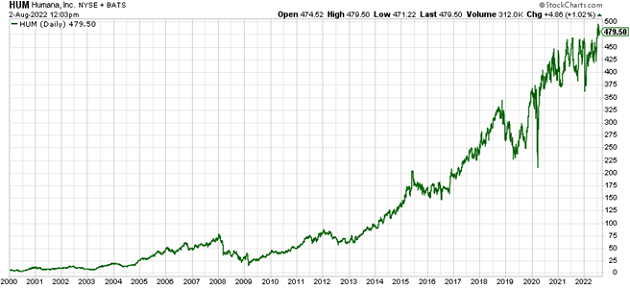
Source: StockCharts
UnitedHealth Group (UNH) is another hall of fame healthcare stock. Its stock has skyrocketed around 179,566% since 1990. That’s good for a more than 25%-per-year return.
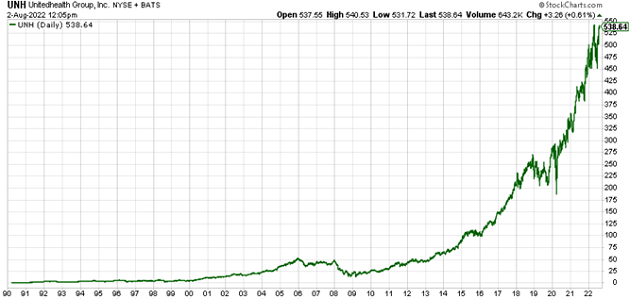
Source: StockCharts
Biotech giant Amgen (AMGN) is another huge winner. It’s rallied around 145,194% since it went public in the early ‘80s.
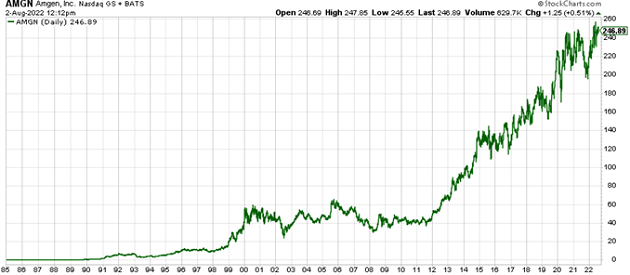
Source: StockCharts
Healthcare stocks are in hot demand…
The Health Care Select Sector SPRD Fund (XLV), which invests in basket of healthcare stocks, has held up much better than the S&P 500.
At the time of writing, it’s down just 5% on the year, while the S&P 500 is down more than 13%.
And I expect this trend to continue…
A couple of weeks ago, XLV closed above its 200-day moving average. In other words, it’s still in a strong uptrend.
And this is being driven by standout performances from the world’s biggest, most important healthcare stocks.
You see, there are just 40 “mega cap” stocks in the world…
A mega cap stock is a company worth more than $200 billion.
Today, just 15 of the world’s mega cap stocks are above their 200-day moving average. And eight of those are healthcare stocks.
This group includes UnitedHealth Group, Johnson & Johnson, Ely Lilly, and Merck.
These are gigantic companies. They set the tone for the entire healthcare space. And the impressive strength I’m seeing from these healthcare giants tells me there’s strong institutional appetite for healthcare stocks.
But it’s not just the mega caps that are catching a bid.
Cigna (CI)—the $86 billion health insurer—is trading near 52-week highs.
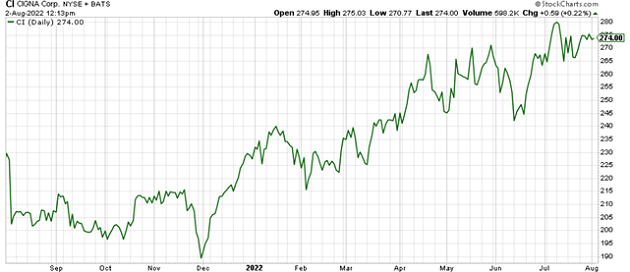
Source: StockCharts
The same goes for $61 billion health insurance giant Humana. It’s up around 4% on the year, and trading within about 4% of its all-time highs.
On August 29, $49 billion medical device company McKesson (MCK) closed at all-time highs.
This is the sort of market participation I love to see. However, I’m not just encouraged by the recent price action of healthcare stocks.
We’ve also seen a huge surge in merger and acquisition activity (M&A) in the healthcare space…
Last month, The Wall Street Journal reported pharma giant Merck plans to acquire biotech company Seagen for $40 billion. That would make this one of the biggest biotech deals ever.
This is a huge deal. After all, major healthcare companies have a better sense of what’s going on in their own industries than the savviest hedge funds on Wall Street.
If they’re shelling out billions of dollars to buy other companies in the space, that tells you they see attractive valuations.
And I expect to see a lot more healthcare M&A activity in the coming months.
According to a recent article in Forbes, the cash balance of the top 20 biopharma companies combined is over $300 billion. That’s enough to buy up every small- and medium-sized biotech firm at current valuations.
In other words, Big Pharma has hundreds of billions of dollars in dry powder that they could put to work.
And that’s just one corner of the healthcare sector.
There’s also been a flurry of M&A activity in the health information services industry…
These companies help hospitals and other healthcare providers manage their clinical data to improve patient treatment. A couple weeks ago, Amazon (AMZN) acquired 1Life Healthcare (ONEM). This caused ONEM’s share price to surge 67% in a day.
This announcement came just months after it was reported Convey Health Solutions (CNVY) is in talks to be acquired by TPG Capital. That caused Convey’s share price to spike 138% in a day.
Zooming out, health information services stocks are showing incredible strength.
Take a look at the SPDR S&P Health Care Services ETF (XHS), a good gauge for the overall sector.
This chart compares the performance of XHS with the SPDR S&P 500 ETF Trust (SPY). When this line is rising, it means health info services stocks are outperforming the market.
The industry bottomed relative to the market back in February:
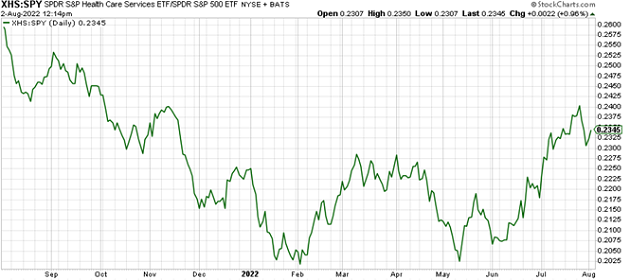
Source: StockCharts
In short, health information services is one of the strongest subsectors in one of the strongest industries...
And XHS is a simple way to play it.
At the time of writing, XHS has rallied strongly in recent months and is now attempting to reclaim its 200-day moving average (blue line):
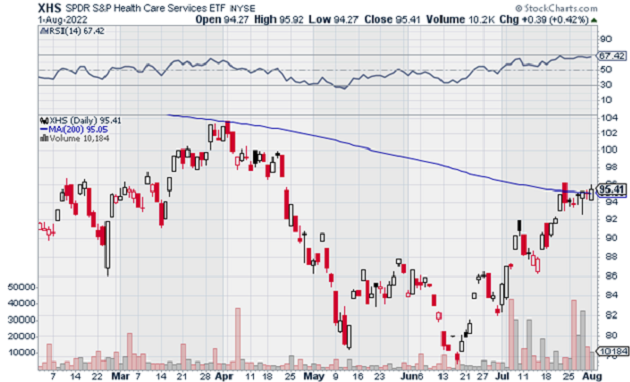
Source: StockCharts
Not only that... but big buying volume is starting to pour in.
Consider buying shares today.
3 Breakthrough Stocks Set to Double Your Money in 2022
Get our latest report where we reveal our three favorite stocks that can hand you 100% gains as they disrupt whole industries. Get your free copy here.
Related: These Stocks Are Sending a Signal (Like Amazon in 2008)

